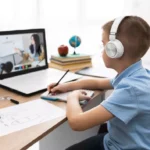- Tanisha
- October 26, 2024
In today’s fast-paced world, the pursuit of knowledge goes beyond traditional academics. Music classes have emerged as a vital component of holistic education, providing students with opportunities to enhance their creativity and brain function. Research has shown that engaging in music not only nurtures artistic talents but also significantly contributes to academic improvement. This blog post delves into the many benefits of ADA Music Classes, showcasing how they can transform students’ learning experiences and enrich their lives.

The Symphony of Creativity
Creativity is the heartbeat of innovation. Music classes serve as a platform for students to express their creative impulses, whether through playing an instrument, singing, or composing original pieces. Engaging in music cultivates a sense of freedom and exploration that encourages young minds to think outside the box.
When students participate in music classes, they learn to experiment with different sounds, rhythms, and melodies. This process fosters critical thinking skills and allows them to develop a unique artistic voice. Moreover, the collaborative nature of music encourages teamwork and communication, vital skills for success in any field. Thus, students not only become adept musicians but also innovative thinkers who can approach challenges from various perspectives.
Enhancing Cognitive Abilities Through Music
The relationship between music and cognitive function is profound. Studies have shown that learning to play an instrument or engage in musical activities can significantly improve brain function, enhancing memory, attention span, and problem-solving skills.
Music classes involve the use of complex auditory and visual processing, which stimulates multiple areas of the brain. For instance, when students learn to read musical notation, they simultaneously engage in skills like pattern recognition and mathematical reasoning. This multi-faceted approach to learning helps strengthen neural connections, promoting overall brain development. As a result, students not only excel in music but also experience improved performance in their academic subjects.
Music as a Tool for Academic Improvement
Integrating music into the educational experience can lead to remarkable academic improvement. Research has consistently shown that students who participate in music classes often perform better in subjects such as mathematics, science, and language arts.
Music teaches essential skills like discipline and perseverance. Regular practice requires dedication and time management, which are crucial attributes for academic success. Furthermore, music classes provide an enjoyable and stimulating environment that can boost motivation and enthusiasm for learning. When students see the positive impact of music on their academic performance, they are more likely to develop a lifelong passion for learning.
Fostering Emotional Intelligence Through Music
Emotional intelligence is a key factor in personal and professional success. Music classes offer students a unique opportunity to explore their emotions and develop empathy through musical expression.
When students engage in music, they often connect with the emotions conveyed through melodies and lyrics. This process allows them to better understand their feelings and those of others. Moreover, collaborative music-making fosters a sense of community and belonging, essential for developing strong interpersonal relationships. By nurturing emotional intelligence, music classes equip students with the skills needed to navigate social situations and build meaningful connections throughout their lives.
Building Confidence and Self-Expression
Confidence is essential for success in any endeavor. Music classes empower students to step outside their comfort zones and showcase their talents, ultimately boosting their self-esteem.
Performing in front of an audience, whether in a small classroom setting or a larger concert, challenges students to overcome their fears and anxieties. This experience of sharing their musical abilities fosters a sense of accomplishment and pride. Additionally, music classes encourage students to express themselves creatively, allowing them to develop a strong sense of identity. As students gain confidence in their musical abilities, they become more willing to take risks and explore new opportunities.
A Holistic Approach to Learning
Education should encompass a wide range of experiences, nurturing not just academic skills but also creativity, emotional intelligence, and personal growth. ADA Music Classes take a holistic approach to education, recognizing the importance of music in shaping well-rounded individuals.
By integrating music into the curriculum, students experience a balanced education that promotes creativity and cognitive development. The diverse skill sets developed through music classes enhance students’ overall learning experiences, allowing them to excel in various subjects. This comprehensive approach to education prepares students for the challenges of the future, equipping them with the tools necessary for success in a rapidly changing world.
Community and Collaboration in Music Classes
Music has the power to bring people together. In ADA Music Classes, students engage in collaborative projects, ensemble performances, and group activities that foster a sense of community.
Through collaboration, students learn the value of teamwork and communication. They develop social skills as they interact with peers, share ideas, and work towards a common goal. This cooperative spirit enhances their overall learning experience and creates lasting friendships. Additionally, the sense of belonging that comes from participating in a musical community contributes to students’ emotional well-being, creating a supportive environment for growth.
The Lifelong Benefits of Music Education
Investing in music education is an investment in a brighter future. The benefits of music classes extend far beyond the classroom, shaping students into well-rounded individuals who can thrive in various aspects of life.
Research consistently shows that individuals with a background in music often excel in their careers, demonstrating creativity, critical thinking, and collaboration. These skills are highly sought after by employers in today’s competitive job market. Moreover, the discipline and perseverance cultivated through music education equip students to navigate challenges with resilience. As they carry these lessons into adulthood, the impact of music classes resonates throughout their lives.
Conclusion: The Harmony of Music and Education
In conclusion, ADA Music Classes offer a unique opportunity to enhance creativity and brain function while promoting academic improvement. By participating in music education, students develop essential skills that positively impact their academic performance and personal growth.
As we continue to explore the importance of a well-rounded education, it is clear that music plays a vital role in shaping the leaders of tomorrow. Embracing music education is an investment in creativity, cognitive development, and emotional intelligence. Therefore, we encourage you to join us at Achievers Destination Academy and discover the transformative power of music classes.
Follow Achievers Destination Academy for updates, and visit our site for more details: www.adaminischool.com
Author:
Achievers Destination Academy
Search
Categories
- Abacus(11)
- Abacus Franchise(2)
- Abacus Workshop(1)
- ADA Chess(2)
- ADA French(3)
- ADA Talent Show(1)
- Art & Coloring Competition(1)
- Biology(1)
- Classes(1)
- Covid19(1)
- DATA Privacy(1)
- Hand Writing(3)
- Holistic Abacus(6)
- Holistic Handwriting(2)
- Holistic Learning(5)
- Holistic Memory Technique(5)
- Holistic Phonics(8)
- Holistic Public Speaking(3)
- Holistic Spell Bee(7)
- Holistic Vedic Maths(13)
- Home(5)
- Keyboard(1)
- Mental Maths Competition(1)
- Music(1)
- Online Classes(1)
- Online School(3)
- Phonics(4)
- Phonics Franchise(1)
- Schools(1)
- Spell Bee(5)
- Spell Bee Competition(10)
- Trending Topics- 2023(19)
- Uncategorized(6)
- Vedic Maths(6)
- Your Child(1)
Tags
Gallery





